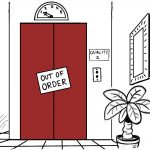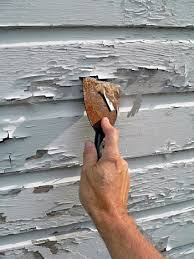Condo corporations are not landlords. The expectation that they act as landlords can create conflict and confusion within a condo community.
All high-rise buildings experience periodic equipment breakdowns. An elevator may be out of service for a number of weeks, an underground garage may have limited access or a swimming pool closed.
Condo owners may expect all amenities and services to be fully operational at all times. Any closure, temporary or long-term, can be viewed as unacceptable.
For tenants in a rental building, loss of amenities or services included in rent may be cause to complain or possibly for compensation under the Ontario Residential Tenancies Act.
Condo owners do not pay maintenance fees and have elected directors to make decisions on their behalf. These directors are volunteers who often employ management to manage on their behalf. Directors or management may choose to delay or not undertake repairs for any number of reasons.
Condo corporations managing a home for hundreds of individuals have unique challenges. Funds are never unlimited and work undertaken for one condo owner may have adverse implications for another. Condo directors and management have a responsibility to balance these conflicts, based on their experience, in the best interests of the condo corporation.
Delayed maintenance, repair or replacement generally falls into one of five areas.
Financial Constraints
Work requires money that may not be available. It may be necessary to delay work until funds are available. This may require that some work be delayed until a future fiscal year. This is not uncommon when a reserve fund has not been fully funded or when a reserve fund study fails to incorporate specific work. Frustrating as this may be for some condo owners, the alternatives of increasing condo fees or a special assessment are also unappealing.
Process
It takes time to develop job specifications and a tender package prior to obtaining bids for necessary work. Bids must then be reviewed and one selected within the time
constraints of a volunteer board. Once a bid has been accepted and contract signed, it may take time until contractors or parts are available to commence a project.
Efficiency
It can take time to identify the source of certain problems. Taking time to develop a permanent solution rather than undertaking a temporary solution by addressing visible symptoms, such as dripping water, is almost always preferable. Other times it may be more economical to delay certain repairs, such as a window replacement or door repairs, until a minimum number can be done at the same time.
 Timing
Timing
Some work is best undertaken during certain times of the year. Cold, damp or hot weather may affect the quality of work and permanency of a repair.
Insurance or Tarion
When insurance companies are involved, repairs may have to wait until an insurance investigation is complete and approved. For new condo buildings, repairs may be covered under a Tarion warranty. In either case it would be irresponsible for a condo corporation to spend corporation money to undertake work at the risk of losing insurance or Tarion warranty coverage.
A condo resident requiring balcony repairs or unable to use the swimming pool may feel inconvenienced when their lifestyle is impacted by delays in certain repairs. While not unexpected, such concerns have to be considered in a broader context of condo community management.
Ryan Stone of Summa Property Management explains that “Condo corporations managing a home for hundreds of individuals have unique challenges. Funds are never unlimited and work undertaken for one condo owner may have adverse implications for another. Condo directors and management have a responsibility to balance these conflicts in what they feel are the best overall interests of the condo corporation.”
 When condos building repairs or closures do occur, many of the problems are less about the decisions made by condo corporations than the communication between management, the board and owners. Better communication nearly always resolves most of these problems.
When condos building repairs or closures do occur, many of the problems are less about the decisions made by condo corporations than the communication between management, the board and owners. Better communication nearly always resolves most of these problems.
Find Vendors in these Related Categories
- Cleaning & Janitorial Services
- Cleaning Services - Ducts
- Cleaning Services - Windows
- Condo Management
- Contractors - Electrical
- Contractors - General
- Contractors - Mechanical
- Door & Lock Services
- Maintenance Services - General
- Odour Control
- Painting
- Parking Management/Cleaning Services
- Paving, Concrete and Epoxy Coatings
- Pest Control
- Plumbing Services
- Rental and Tenant Services
- Restoration Services
- Snow Removal Services
- Superintendent Services
- Waste Services
- Water Proofing & Systems
- Window Replacement/Repair




